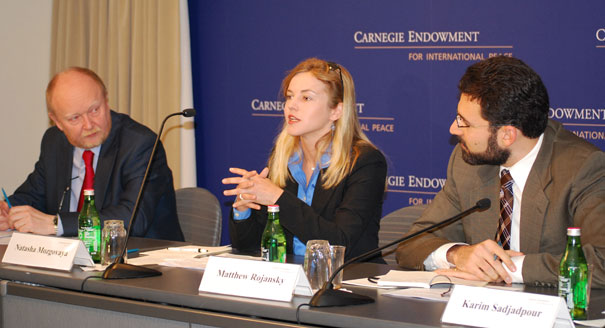Registration
Thank you!
You will receive an email confirming your registration.
Russia’s approach to the Middle East is at a turning point—the changes associated with the Arab Spring continue to destabilize regimes and alliances, Iran appears to be moving ahead with its nuclear program in defiance of Russia and the West, and Israel, once a bulwark against Russian influence in the region, is now pursuing closer ties with the Kremlin. Natasha Mozgovaya, chief U.S. correspondent for the Israeli newspaper Haaretz, joined a panel of Carnegie experts to assess Russia’s past, present, and future roles in a rapidly-changing Middle East. Carnegie’s Matthew Rojansky moderated the discussion.
Russia’s Waning Influence
- Lack of Strategy: Twenty years after the end of the Cold War, Russia has not developed a coherent foreign policy towards the Middle East, said Carnegie’s Marwan Muasher. With change sweeping across the region, Russia will be unable to formulate a meaningful, lasting strategy in the foreseeable future, he added.
- Change in Stance: Historically, Russia – and the Soviet Union before it – often supported “the oppressed” and used its policy in the region to challenge the United States, noted Muasher. Today, however, Russia is more concerned about looking after its own economic interests. Russia has played virtually no role in the Arab-Israeli peace process and it opposed intervention against the Gadhafi regime in Libya.
- Russia and Syria: Russia’s refusal to endorse UN resolutions against the Assad regime is alienating Russia from most Syrian citizens and “hurting its own chances for any longer-term influence in the region,” argued Muasher. “When Syria falls, Russia will be left with no friends in the Arab world,” he concluded.
Relations with Israel
- Closer Ties: Since the Soviet collapse in 1991, Israel’s relations with Russia have improved significantly, noted Mozgovaya. Economic cooperation continues to grow with plans to open a branch of Skolkovo, Russia’s version of Silicon Valley, in Israel. In 2010, due to a visa-free regime, more Russian tourists visited Israel than from any other country, she said.
- Points of Contention: Russia’s reluctance to support economic sanctions or military strikes against Iran’s nuclear facilities concerns Israel, which regards Iran’s nuclear program as an existential threat, said Mozgovaya. Jerusalem also views Russia’s tacit support for the Assad regime as destabilizing because it preserves the anti-Israeli alliance of Damascus, Tehran, and Hezbollah. Russia’s lack of interest in promoting Middle East peace and failure to classify Hezbollah and Hamas as terrorist organizations frustrates Israel further, she concluded.
Relations with Iran
- Historic Baggage: Carnegie’s Karim Sadjadpour noted that there is “a tremendous amount of historic baggage” between Russia and Iran. For example, the 1828 Treaty of Turkmenchay, in which Iran ceded large swaths of territory to the Russian Empire, remains a source of humiliation for many Iranians. There is a general perception that Russia often “took but didn’t give anything back,” he added. More recently, the Soviet Union’s unsuccessful attempt to annex Iranian Azerbaijan in 1946 was seen as an affront to Iran’s territorial integrity, he concluded.
- Strategic Cooperation: Despite popular mistrust towards Russia, Moscow and Tehran have developed a strategic partnership, Sadjadpour said. Iran’s foreign minister once declared that “Iran is the sole remaining impediment to this [Russia’s] encirclement” by NATO. Russia and Iran have cooperated extensively on nuclear and intelligence issues but have not developed close economic ties, he added.
- Public Opinion: Although the Soviet Union exercised “soft” power in Iran through the communist Tudeh party before the 1979 revolution, Sadjadpour noted that there is now a feeling of “popular alienation” towards Russia. Many Iranians opposed to the current regime believe that Russia is helping to keep the Islamic Republic in power. As a result, one can now hear chants of “death to China, death to Russia” on the streets of Iran, he concluded.
- Russia’s Perspective: For Russia, “Iran is a useful thorn in the side of the United States,” said Sadjadpour. Russian officials appreciate the fact that Iran is not a major competitor in the European natural gas market and that Tehran remains silent on the situation in Chechnya and the North Caucasus, he added. In private, however, Russian officials have expressed serious concerns about Iran’s nuclear program. If the United States or Israel attacks Iran, it would destroy popular goodwill towards the West, entrench the regime, and keep Iran under Russia’s general sphere of influence, Sadjadpour concluded.
- Iran’s Lost Influence: Despite deep historical and cultural ties to the region, Iran wields little influence in Central Asia, noted Sadjadpour. During the Soviet era, Iran made little effort to engage Tajikistan and Uzbekistan, both historical centers of Persian culture.
The View from Moscow
- Limited Engagement: Since Putin came to power, the Russian government has attempted to engage the Middle East, but its efforts have borne little fruit, said Carnegie Moscow’s Alexei Malashenko. Nevertheless, Russia believes that it could “occupy a special niche” in the Muslim world and serve as a Eurasian “bridge” between East and West, he added. In terms of power projection, Russia’s ability to veto resolutions on Syria or Iran in the UN Security Council does not mean that it has real influence in the Middle East, argued Muasher.
- Russia and the Arab Uprisings: Most Russians are skeptical of revolution because they know from historical experience what costs such upheaval entails, said Mozgovaya. Nevertheless, revolts across the Arab world have particular resonance for the Kremlin given Russia’s growing anti-government protest movement. Russian officials are concerned that uprisings similar to those in Egypt and Libya could break out in Central Asia and the North Caucasus, noted Malashenko.
